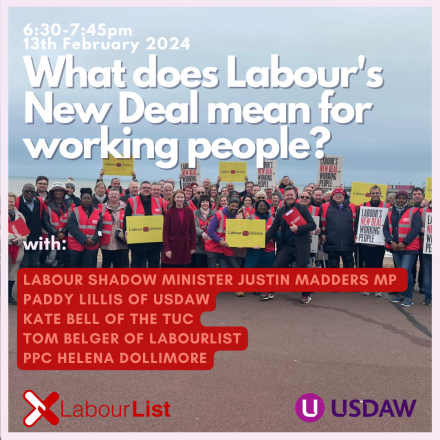
Workplace rights are set to be one of the key battlegrounds at the next general election. This week is the TUC’s HeartUnions week, the ideal time to highlight how Labour and the affiliated unions, working together, have devised some of the positive workplace changes planned if Labour secures a victory at the election.
Unions like Usdaw have been a driving force behind Labour’s New Deal for Working People. Improving the working lives of our members is what unions are here for. Our unique connection with the Labour Party allows us to use our hard-won industrial knowledge and experience to secure positive policy changes for working people.
We know everyone’s experience of work is different. For so many reasons, there are many among us who cannot work, who need to work part time or who have to work several jobs. There are those who do a job they love, and many who don’t.
But wherever you sit with the world of work, working conditions – pay, hours, dignity in the workplace, fair treatment – will affect you or your loved ones. And far too many people in Britain are getting a raw deal at the moment, feeling the effects of insecure work.
The New Deal will introduce vital, practical changes that add up into happier, healthier and more productive workplaces for the working people of Britain. The plan is broad and ambitious, but for Usdaw members, there are a few key points that really stand out.
Labour will create a real living wage and ban zero-hours contacts
Labour – the party that created the minimum wage – will build on this by introducing a real living wage for all workers from the age of 18. This is hugely important, but it is not enough to have a good rate of pay if you don’t have a contract with secure hours of work. Labour will ban exploitative zero-hours contracts and ensure anyone working a regular number of hours for 12 weeks or more has the right to a contract that reflects their usual hours of work.
A point that is often not recognised is that a ban on zero-hours contracts will not be effective if a zero-hours contract can simply be replaced with a two- or three-hours-a-week contract. That is why the right to a regular contract is so crucial. It will make a huge difference to Usdaw members in retail, many of whom are on ‘short-hours’ contracts.
These contracts provide a bare minimum of secure hours and require a great deal of flexibility on the remaining hours, leaving people in limbo about when and how much they are working.
Usdaw’s own research has shown that Black workers and disabled workers are even more likely to be adversely affected by the current system. Ending this one-sided flexibility will have a huge impact on the financial security of millions of workers. It will help to redress some of the imbalance that vulnerable workers currently face and will help to support better mental health.
The party will abolish the waiting period for sick pay
But it’s not just about hours. Better support when they are off sick will be a positive change for millions of workers too. Labour has pledged to abolish the ‘three waiting days’ that are part of the statutory sick pay scheme. Many people in salaried roles may not even be aware of how rife this practice is, but right across the hourly-paid sector – whether you work in retail, warehousing, hospitality or care work – millions of workers don’t receive any sick pay until their fourth day of sickness absence.
This has two consequences. First, the obvious: millions of low-paid workers lose out on much-needed pay, just because they have fallen ill. Secondly, many workers simply cannot afford to take time off even if they are ill and are therefore forced to attend work when they shouldn’t, spreading bugs across the workplace.
This issue became very visible during Covid, but any lessons that could have been learned by the Tories were quickly forgotten as the pandemic eased. Workers have been left struggling on reduced pay at a time when they need support. Ending this practice will have a huge impact for millions of working people in Britain, making the workplace at once fairer and safer.
Anti-trade union laws will also be repealed
Finally, all of the work we do as unions isn’t possible if we don’t have strong trade union laws to support our work. As part of Labour’s New Deal plan, the party will repeal the anti-union laws brought in over the last 14 years.
Unions do all we can to help individual members, but our real strength comes from our collective agreements, where we have the voices of many workers behind us.
Labour understands that unionised workplaces are much more likely to provide decent pay, better workplace benefits, security and respect and dignity for staff. That is why Labour has pledged to remove the punitive restrictions the Tories have put on trade union activity, such as the Trade Union Act 2016, and make it easier for unions like Usdaw to negotiate new recognition agreements with companies on behalf of their workers.
Usdaw will do all we can to support Labour and fight for change
Why is Labour doing all this? They are doing it because they, having worked so closely with trade unions to develop the New Deal, truly understand the difference these changes will make.
For Usdaw and our members, the next year will be crucial. Working people and their families are at breaking point and desperately need the glint of hope that is being offered by Labour.
As we go into the election year, we don’t know when that election and the much-needed change will come, but one thing we do know is that Usdaw and its members will do all we can to support Labour and fight for the change we need.
*** Join LabourList & Usdaw’s online discussion on what Labour’s New Deal means for working people on Tuesday, February 13th at 6.30pm. With Usdaw’s Paddy Lillis, Labour MP Justin Madders, the TUC’s Kate Bell, Labour PPC Helena Dollimore and LabourList’s Tom Belger. Tickets here.***




More from LabourList
West of England mayoral election: Who are the Labour candidates hoping to replace Dan Norris?
Labour’s Budget 2024: What policies could Rachel Reeves announce?
The Labour ministers dominating the airwaves on morning broadcast rounds